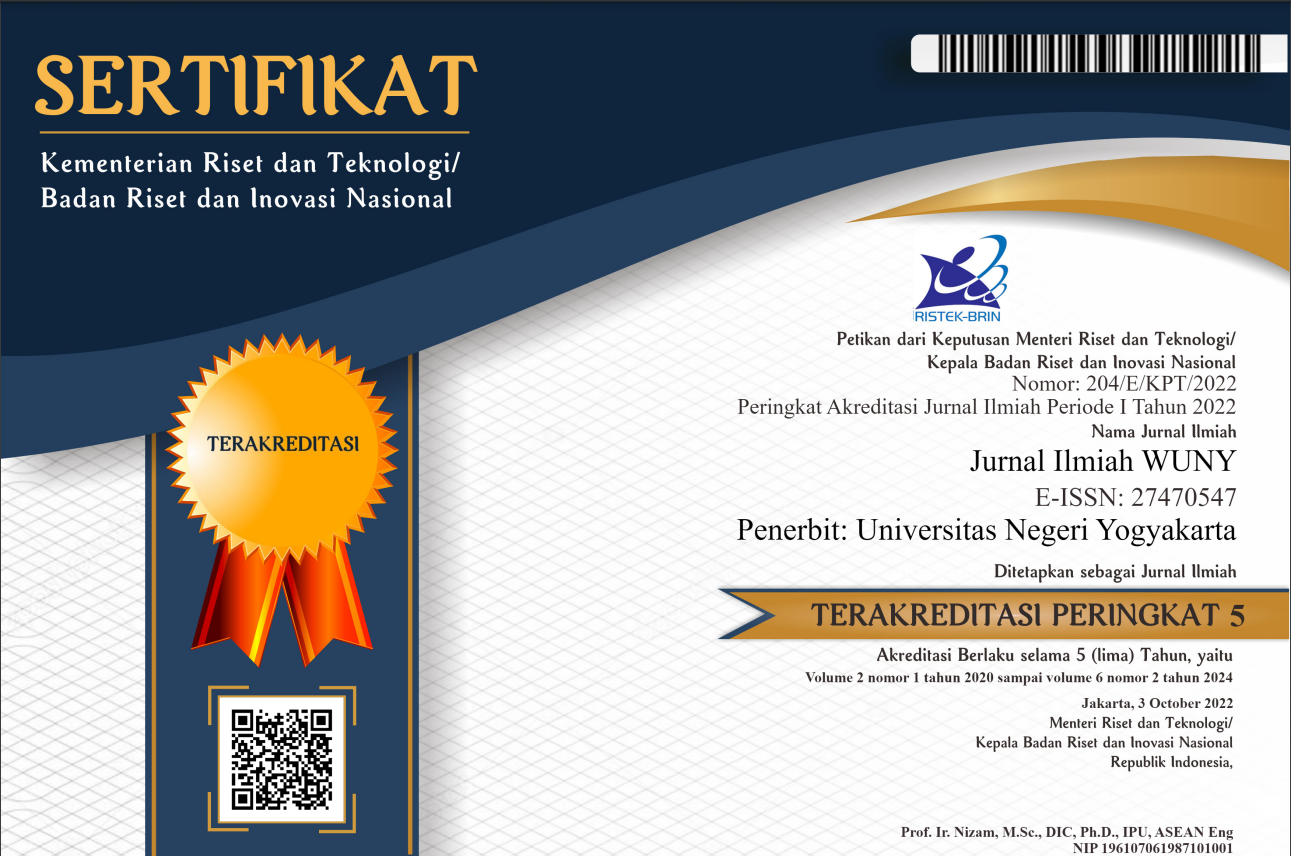Exploring Teacher Resilience in Indonesia: A Scoping Review of Challenges, Strategies, and Support Mechanisms
Downloads
The number of students enrolled in Indonesia's education departments has remained high, as seen in the case of the English Education Program at Universitas Negeri Yogyakarta (UNY) and there are over 3.4 million active teachers nationwide. However, teachers face various challenges, including heavy workloads, low salaries, inadequate facilities, and the pressures of adapting to rapid curriculum changes and the Covid-19 pandemic. This study explores factors contributing to the resilience of Indonesian teachers by elaborating it to the paradigm from Beltman (2020); person-focused perspective, process-focused perspective, context-focused perspective, and system-focused perspective. The study is intended to capture broad aspects of resilience, such as psychological, social, professional, and social factors that support teachers in overcoming challenges. This article adopts a scoping review methodology, following Arksey and O'Malley's (2005) framework, to map existing literature on teachers' resilience in Indonesia over the last five years. The review process includes five stages: identifying the research question, selecting relevant studies, study selection, charting the data, and summarizing the results. The findings emphasize that teacher resilience in Indonesia is not solely an individual trait but rather a dynamic interplay of personal characteristics, professional skills, social support, and organizational factors. The research highlights the crucial role of self-efficacy, emotional regulation, and social networks, as well as the importance of school leadership and community support in fostering resilience.
Amin, M., Nuriadi, N., Soepriyanti, H., & Thohir, L. (2022). Teacher Resilience in Facing Changes in Education Policy due to Covid-19 Pandemic. In Indonesian TESOL Journal (Vol. 4, Issue 1). Online.
Bahriadi, B., Suriansyah, A., & Sulaiman, S. (2022). Continuous Professional Development Model to Improve Teacher Professional Competence. International Journal of Social Science And Human Research, 05(12). https://doi.org/10.47191/ijsshr/v5-i12-89
Beltman, S. (2020). Understanding and Examining Teacher Resilience from Multiple Perspectives. In Cultivating Teacher Resilience: International Approaches, Applications and Impact (pp. 11–26). Springer Singapore. https://doi.org/10.1007/978-981-15-5963-1_2
Cirocki, A., Anam, ul, Retnaningdyah, P., & Soden, B. (2023). Measuring Job Satisfaction of Indonesian Secondary School English Language Teachers Before and During the Pandemic: A Mixed-Methods Study. https://doi.org/10.55593/ej.26106a1
Damar, E. A. (2018). Identifying motivational factors of pre-service EFL teachers. Academic Journal of Interdisciplinary Studies, 7(1), 147–151. https://doi.org/10.2478/ajis-2018-0015
Go, A. M., Kurniawan, D., & Setiawan, A. A. (2022). Teachers' Metamorphoses: A Narrative Inquiry into Indonesian Secondary School Teachers' Resilience during the Covid-19 Pandemic. European Journal of Teaching and Education, 4(4), 1–12. https://doi.org/10.33422/ejte.v4i4.716
Haerani, R., Masunah, J., Narawati, T., Rochyadi, E., & Mujiarto. (2020). Models of arts teacher's professional development. International Journal of Higher Education, 9(6). https://doi.org/10.5430/ijhe.v9n6p77
Harahap, S., Herika Hermanu, D., & Sugiharti, T. (2022). Lombok Teachers and Principals Building Resilience in Facing Earthquakes and Covid-19 Pandemic. The Asian Institute of Research Education Quarterly Reviews, 5(2), 153–163. https://doi.org/10.31014/aior.1993.05.02.477
Hidayah, R., Wangid, M. N., & Wuryandani, W. (2022). Elementary School Teacher Perception of Curriculum Changes in Indonesia. Pegem Egitim ve Ogretim Dergisi, 12(2), 77–88. https://doi.org/10.47750/pegegog.12.02.07
Ismail, S. M., & Nikpoo, I. (2023). Resilience, immunity, L2-teacher grit, and reflective teaching in language instruction: in service classes matters. Asian-Pacific Journal of Second and Foreign Language Education, 8(1). https://doi.org/10.1186/s40862-023-00217-1
Izzah, N., & Febria, D. (2023). TESOL Teachers' Resilience to Encounter Challenges and Explore Opportunities during COVID-19 Pandemic: A Case Study. Elsya : Journal of English Language Studies, 5(3), 372–384. https://doi.org/10.31849/elsya.v5i3.14363
Mansfield, C. F., Beltman, S., Price, A., & McConney, A. (2012). " Don't sweat the small stuff:" Understanding teacher resilience at the chalkface. Teaching and Teacher Education, 28(3), 357–367. https://doi.org/10.1016/j.tate.2011.11.001
Nurul Huda, S. A., Suyanto, Arifi, A., Putranta, H., & Azizah, A. N. M. (2021). Experiences of participants in teacher professional education on obtaining soft skills: A case study in Indonesia. European Journal of Educational Research, 10(1), 313–325. https://doi.org/10.12973/EU-JER.10.1.313
Parrott, E., Bernardino, A., Lomeli-Rodriguez, M., Burgess, R., Rahman, A., Direzkia, Y., & Joffe, H. (2024). Community Resilience after Disasters: Exploring Teacher, Caregiver and Student Conceptualisations in Indonesia. Sustainability (Switzerland), 16(1). https://doi.org/10.3390/su16010073
Potolea, D., & Toma, S. (2023). Rethinking Teacher Education From The Perspective Of Teacher Resilience. Proceedings of the 9th International Conference Education Facing Contemporary World Issues (Edu World 2022), 3-4 June, 2022, University of PiteÈ™ti, PiteÈ™ti, Romania, 5, 1143–1151. https://doi.org/10.15405/epes.23045.115
Rido, A., Kuswoyo, H., & Mandasari, B. (2022). SYNCHRONOUS AND ASYNCHRONOUS ONLINE LEARNING IN ENGLISH LANGUAGE CLASSROOMS IN INDONESIA: A LITERATURE REVIEW.
Rizky Listyaputri, D., & Liana, C. (2023). 5 0 / 2 0 2 3 Explaining Teachers' Resilience and Well-being. Drs. Artono, M.Hum. 1 Technium Social Sciences Journal, 50, 21–25. www.techniumscience.com
Rusydi, A., Subroto, W. T., & Sakti, N. C. (2023). Influence of Self-Efficacy and Resilience on Subjective Well-Being: A Study of the New Curriculum Implementation in Indonesia. IJORER : International Journal of Recent Educational Research, 4(5), 597–609. https://doi.org/10.46245/ijorer.v4i5.401
Saekan, M. (2023). Problems of The Teacher Profession In In-donesia (Review From The Perspective of Law Number 14 of 2005). Eduvest-Journal of Universal Studies, 3(2), 395–403. http://eduvest.greenvest.co.id
Suryaratri, R. D., Yudhistira, S., & Ulayya, D. (2020, September 5). The influence of social support towards high school teachers' resilience in Jakarta, Indonesia. ACM International Conference Proceeding Series. https://doi.org/10.1145/3452144.3452241
Wahyuni, E. N., Maksum, A., & Ma'ruf, H. (2024). Exploring Protective Factors for Resilience among Teachers in Islamic Elementary Schools in Remote Area. Journal of Innovation in Educational and Cultural Research, 5(3), 510–519. https://doi.org/10.46843/jiecr.v5i3.1557
Wang, Z. (2022). The Effect of EFL Teacher Apprehension and Teacher Burnout on Learners' Academic Achievement. In Frontiers in Psychology (Vol. 12). Frontiers Media S.A. https://doi.org/10.3389/fpsyg.2021.839452
Zhang, S., & Luo, Y. (2023). Review on the conceptual framework of teacher resilience. In Frontiers in Psychology (Vol. 14). Frontiers Media SA. https://doi.org/10.3389/fpsyg.2023.1179984
Copyright (c) 2025 Jurnal Ilmiah WUNY

This work is licensed under a Creative Commons Attribution-ShareAlike 4.0 International License.
This work is licensed under a Creative Commons Attribution-ShareAlike 4.0 International License.








